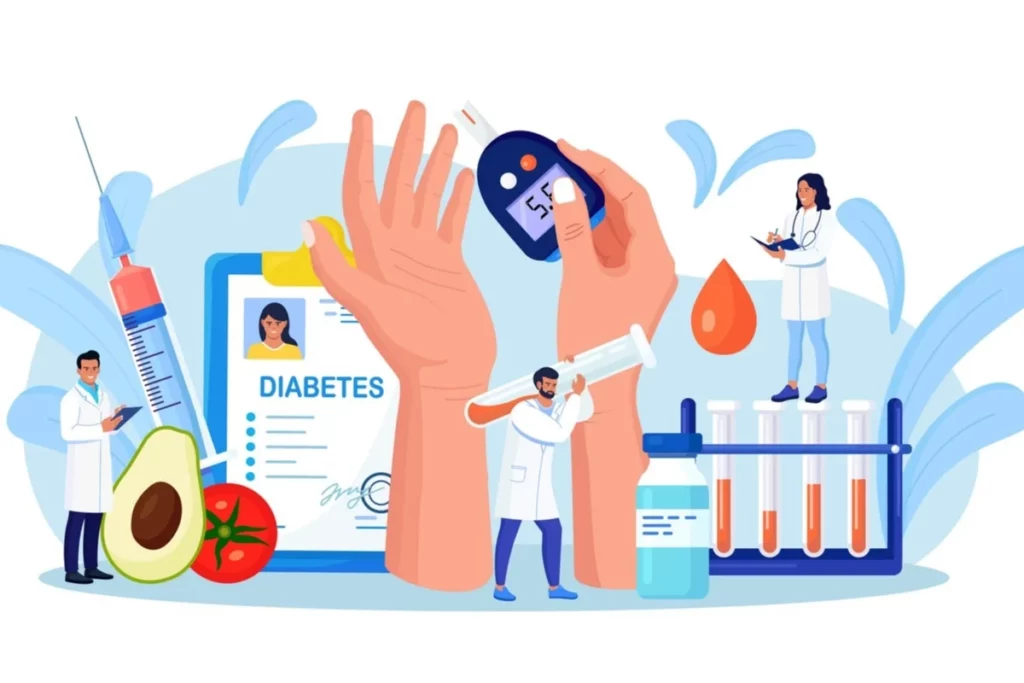The journey of treating diabetes is multifaceted, involving lifestyle modifications, medication, and regular monitoring. This guide aims to demystify the various diabetes treatment options available, providing insight into the latest advancements and practical strategies for managing this condition. Whether you’re newly diagnosed or seeking to update your knowledge, this comprehensive overview will equip you with essential information to make informed decisions about your diabetes care.
Contents
What Are The Best Diabetes Treatment Options?
 Controlling diabetes effectively involves a multi-faceted approach, tailored to the individual’s specific type of diabetes, lifestyle, and overall health. Here are key strategies that are often recommended in diabetes treatment options:
Controlling diabetes effectively involves a multi-faceted approach, tailored to the individual’s specific type of diabetes, lifestyle, and overall health. Here are key strategies that are often recommended in diabetes treatment options:
Healthy Diet
The cornerstone of diabetes management is a well-balanced diet. This involves eating a variety of foods rich in nutrients and low in fat and calories. Key components include plenty of vegetables, fruits, and whole grains. It’s not just about what you eat, but also how much; portion control plays a crucial role in managing blood sugar levels.
For those with diabetes, understanding and managing carbohydrate intake is particularly important because carbohydrates have the most significant impact on blood sugar. This doesn’t mean eliminating carbs entirely but rather choosing complex carbohydrates, like those found in whole grains, and being mindful of portions. In addition, incorporating lean proteins and healthy fats can help stabilize blood sugar.
Regular Physical Activity
Exercise is a vital part of diabetes management. Regular physical activity helps your body use insulin more efficiently, thereby lowering blood sugar levels. Aim for a mix of aerobic activities (like brisk walking, swimming, or cycling) and strength training exercises. Not only does exercise help with glucose management, but it also aids in weight control, improves cardiovascular health, and boosts overall well-being.
The American Diabetes Association recommends at least 150 minutes of moderate to vigorous aerobic activity per week, spread over at least three days, with no more than two consecutive days without exercise.
Monitoring Blood Sugar
Keeping a close eye on blood sugar levels is essential for managing diabetes. Regular monitoring can help you understand the impact of your dietary choices, physical activity, and medications on your blood sugar levels. This ongoing data collection is crucial for making informed decisions about lifestyle and treatment.
Many people with diabetes use a blood glucose meter for daily monitoring, while others might use continuous glucose monitoring (CGM) systems that provide real-time insights into glucose trends and patterns. This information can be invaluable for preventing both short-term complications like hypoglycemia and long-term complications.
Medication Adherence
For many with diabetes, medications are a key component of treatment. It’s vital to take all medications, including insulin if prescribed, exactly as directed by your healthcare provider. The types of medication prescribed can vary greatly, especially between Type 1 and Type 2 diabetes.
For example, those with Type 1 diabetes require insulin therapy, while those with Type 2 might manage their condition with oral medications, non-insulin injectables, or a combination of these treatments. Regularly communicating with your healthcare provider and reporting any side effects or concerns with your medications is crucial for optimal management.
Weight Management
 Maintaining a healthy weight is especially important in the management of Type 2 diabetes. Excess body fat, particularly if stored around the abdomen, can increase the body’s resistance to insulin. Losing weight can be challenging, but even a modest weight reduction can significantly improve blood sugar control.
Maintaining a healthy weight is especially important in the management of Type 2 diabetes. Excess body fat, particularly if stored around the abdomen, can increase the body’s resistance to insulin. Losing weight can be challenging, but even a modest weight reduction can significantly improve blood sugar control.
In many cases, weight loss can be achieved through dietary changes and increased physical activity. However, it’s important to set realistic goals and potentially seek the guidance of a dietitian or a healthcare professional for a tailored plan. Remember, the goal is not just weight loss, but overall health improvement.
Stress Management
Stress plays a significant role in diabetes management. When you’re stressed, your body releases hormones like cortisol and adrenaline, which can cause blood sugar levels to rise. This is why individuals with diabetes must employ effective stress-reduction strategies. Techniques such as mindfulness meditation, yoga, deep breathing exercises, and progressive muscle relaxation can be very helpful.
Additionally, time management techniques and setting realistic goals can reduce daily stress. Individuals with diabetes need to identify their stress triggers and develop coping strategies that work for them, which might include seeking support from friends, family, or professionals.
Regular Health Check-ups
Regular check-ups with healthcare providers are essential for managing diabetes effectively. These check-ups often include blood sugar monitoring, HbA1c tests (which provide an average blood sugar level over the past two to three months), cholesterol tests, kidney function tests, and blood pressure checks.
These tests help in assessing how well diabetes is being managed and whether any adjustments in treatment are necessary. Regular eye exams and foot exams are also crucial, as diabetes can lead to complications like retinopathy and neuropathy. During these visits, patients have the opportunity to discuss their management strategies with their healthcare providers and address any concerns.
Education and Support
Knowledge is power when it comes to managing diabetes. Understanding the condition, treatment options, and how lifestyle choices affect diabetes is key to successful management. Patient education can come from various sources, including diabetes education programs, healthcare providers, reliable online resources, and support groups. Support groups offer a platform for sharing experiences and tips and can provide emotional support, which is vital for long-term management.
Avoiding Harmful Habits
Certain habits can exacerbate diabetes and lead to complications. Smoking, for instance, increases the risk of heart disease, stroke, and poor blood circulation, all of which are already higher in people with diabetes. Quitting smoking is therefore highly recommended. Similarly, alcohol can affect blood sugar levels and calorie intake.
If alcohol is consumed, it should be in moderation and with an understanding of how it might impact blood sugar levels. Additionally, maintaining a regular sleep pattern can help in managing blood sugar, as irregular sleep patterns can disrupt blood sugar control.
Personalized Care
Every individual with diabetes is unique, and what works for one person may not work for another. Personalized care is about tailoring treatment and management strategies to the individual’s specific needs, lifestyle, and health conditions. This includes customizing meal plans, exercise routines, medication types and dosages, and blood sugar monitoring practices.
Regular consultations with healthcare professionals are key to refining and adjusting the management plan over time. Factors such as age, duration of diabetes, presence of other health conditions, and individual preferences and goals should be considered in the development of a personalized diabetes management plan.
Overall, comprehensive diabetes treatment options encompass a wide range of strategies that must be personalized and regularly adjusted to fit the evolving needs of the individual. It requires a combination of medical treatment, lifestyle adjustments, and continuous education and support.
What Is The Successful Treatment Of Diabetes?
 Among the various diabetes treatment options, successful treatment involves both managing blood sugar levels to prevent complications and addressing broader health concerns to enhance overall well-being. The cornerstone of effective diabetes management is a balanced approach that includes maintaining a healthy diet, engaging in regular physical activity, and adhering to medication regimens.
Among the various diabetes treatment options, successful treatment involves both managing blood sugar levels to prevent complications and addressing broader health concerns to enhance overall well-being. The cornerstone of effective diabetes management is a balanced approach that includes maintaining a healthy diet, engaging in regular physical activity, and adhering to medication regimens.
Most importantly, regular monitoring of blood sugar levels is also vital. Because it provides feedback on the effectiveness of the management plan and helps in making necessary adjustments. Additionally, successful diabetes treatment options extend beyond just controlling blood sugar. It encompasses lifestyle changes aimed at overall health improvement, such as weight management, stress reduction, and cessation of harmful habits like smoking.
Hence, all in all, personalization of treatment is key; what works for one person may not be suitable for another, necessitating a tailored approach that considers the individual’s unique health profile, lifestyle, and preferences. Thus, successful diabetes treatment options are comprehensive and continuous processes.
Conclusion
In conclusion, diabetes treatment options are a multi-faceted journey that extends beyond just controlling blood sugar levels. It involves a combination of healthy eating, regular exercise, medication adherence, and lifestyle modifications, tailored to each individual’s unique needs. Regular monitoring of blood sugar levels and health check-ups are crucial for staying on top of the condition. Equally important is the role of education and emotional support in empowering individuals to manage their diabetes with confidence.
By integrating these various elements into daily life, those living with diabetes can lead healthier, more fulfilling lives while keeping their condition well-managed. Do you want to get rid of diabetes? Join our online diabetes treatment program and reverse Diabetes naturally through lifestyle changes such as a Personalized Diet plan, Exercise, Yoga, dieticians, and health coaches.

